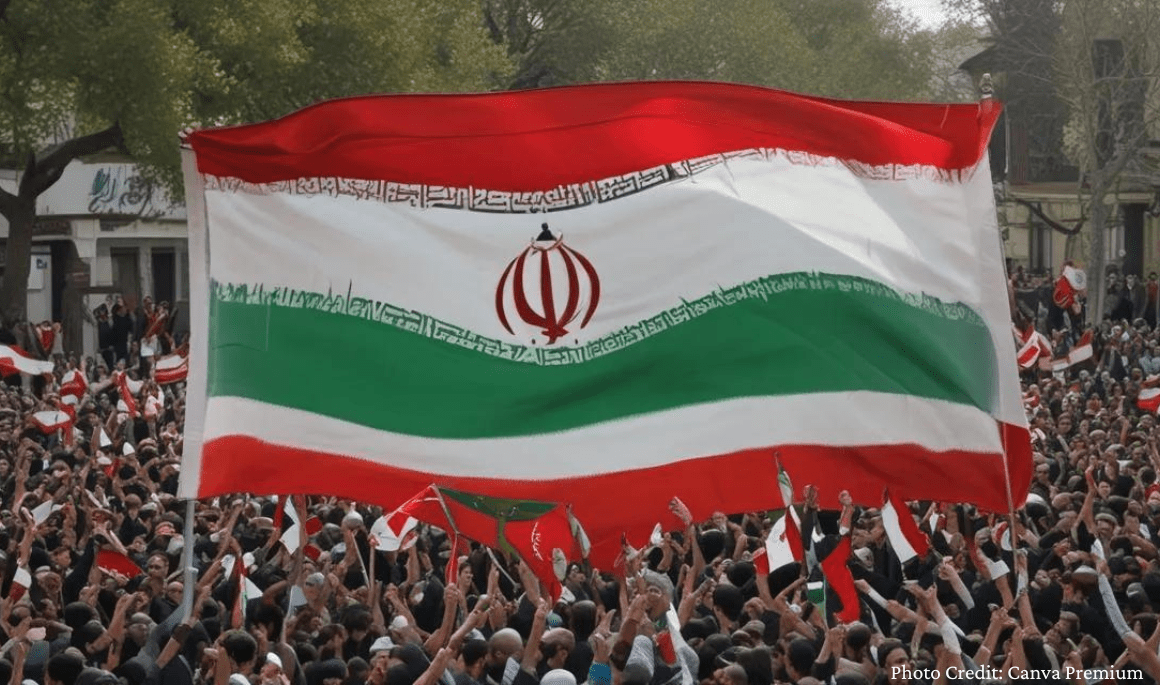- Norwich Blogs
- Blogs
- The Facade of Democracy: The Irrelevance of Iran's Presidential Elections
The Facade of Democracy: The Irrelevance of Iran's Presidential Elections
By Saeid Golkar
Disclaimer: These opinion pieces represent the authors’ personal views, and do not necessarily reflect the official policies or positions of Norwich University or PAWC.

The sudden death of President Ebrahim Raisi in a helicopter crash shocked the Islamic Republic and its allies in the region. During President Raisi's tenure, Iran continued its interventionist regional policies, attacked Israel in retaliation for Israeli attacks on IRGC headquarters in Damascus,[i] strengthened its support of the Shia militia, and expanded its nuclear activities.
As a result of President Raisi’s death, a new round of presidential elections is set to be held in the upcoming weeks. Some in the West believe that the death of Ebrahim Raisi is a “golden opportunity” for a change in the regime’s regional and international policies.[ii] This is, at best, naive wishful thinking and, at worst, deliberately misleading.
Elections in Iran, like other authoritarian regimes, are not meaningful political changes; they are held to legitimize the dictators through managed political participation, the creation of an illusion of competition, and co-opt the elites.[iii] That is why dictators hold frequent elections, usually every 4-5 years.
Iran's election show started a few days ago by the order of Iran’s supreme leader, Ayatollah Khamenei. After the first round of vetting by Iran's Minister of Interior, only 84 candidates - all male, Shia Muslims, and members of the regime's political elites - were able to register for the election.
In the second round of vetting, the Guardian Council, a hardliner body consisting of 12 members, all directly or indirectly appointed by the Supreme Leader, approved only six candidates to run the presidential election campaign. These include hardliner Saeed Jalili, Khamenei's representative in the Supreme National Security Council and former nuclear negotiator; Mohammad Bagher Ghalibaf, the former IRGC commander and the current Parliament Speaker; Alireza Zakani the IRGC-affiliated Tehran Mayor; Amirhossein Ghazizadeh Hashemi, Raisi’s vice president and head of Foundation of Martyrs and Veterans Affairs; Hojatoleslam Mostafa Pourmohammadi, former Ministry of Interior under hardliner Ahmadinejad; and finally Masoud Pezeshkian, a so-called ‘reformist' parliamentarian.[iv]
Three of these six candidates have better chances due to their social base and connection with different political blocs: Saeed Jalili, a radical hardliner popular among younger Islamists; Mohammad Ghalibaf, who has rebranded himself as a neo-hardliner with some support among the older generation of the IRGC; and Masoud Pezeshkian, endorsed by the so-called reformist group.
Iranian hardliners typically support the enforcement of moral codes through policing, increased internet restrictions, and a stronger anti-American stance. Conversely, Iranian reformists generally advocate for greater social and cultural openness, along with fostering closer ties with the West and the United States.
The selection of a few hardliners and one politically weak reformist candidate is a pattern that the Guardian Council has repeated in previous presidential elections like the one in 2021, when Abdolnasser Hemmati, the moderate candidate, was selected to compete with Ebrahim Raisi, and got only 8.4% of votes.[v] The goal is to create the illusion of competition between "reformists" and hardliners, increasing turnout while ensuring that the "reformist" candidate is not popular or strong enough to win the election.
The next phase of this manipulated election will occur on June 28, 2024, when the Iranian people will choose from a list of candidates pre-selected by the Guardian Council. No matter who wins the election, Iran’s domestic and foreign policies are not going to change.
The international community should not expect any meaningful change in Iran’s security and foreign policies for three reasons.
First, all the selected candidates have been vetted twice and chosen for their loyalty to the regime rather than to challenge its ideology or direction. The so-called reformist candidate Pezeshkian, unlike past reformist candidates, did not promise any sweeping changes. In his first TV political advertisement for the election, he emphasized that he would only apply the policies approved by Ayatollah Khamenei in the interview, which disappointed many younger reformists. The difference between these candidates' policies lies in minor executive issues, not in the major policies or direction that the Islamic Republic is heading, which they have no power to shape.
Second, in Iran’s political system, the president is nothing more than an executive manager with no real power. Iran's political system is based on the Guardianship of the Jurist (velayat-e faqih), where a grand Shia clergy (ayatollah) is the main political leader who rules based on Islam and its laws. In this system, the president is the second most powerful figure in theory, with limited power but extensive responsibilities. The Supreme Leader holds the primary authority in shaping Iran’s security, military, and foreign policies. The President must operate under the Supreme Leader's supervision and execute policies established by the leader and non-elected body under the leader’s control.
That is why Khamenei banned any connection between Iran and the United States even after signing the Iran nuclear deal in 2015, despite President Hassan Rouhani’s desire.[vi] President Rouhani was threatened with impeachment after speaking with President Obama by phone after the deal was signed. His foreign minister, Javad Zarif, later confessed that he had zero percent contribution in shaping Iran's foreign policies during his tenure under Rouhani (2013-2021).[vii] Zarif did not have the freedom to choose his facial hairstyle, as he was forced to wear a full beard by Khamenei’s recommendation since shaving the face is not recommended in Islam, according to Shia clergy.
The third reason that the presidential election is irrelevant to understanding the Islamic Republic is the personalization of power by Khamenei.[viii] Since coming to power in 1989, Ayatollah Khamenei has gradually changed the Islamic Republic to a more personalized system in which he concentrated the power in his hands and undermined the official institutions such as the presidency, the parliament, and the Expediency Council. These institutions don’t have much power. All these institutions were controlled by Khamenei’s appointees and have lost their autonomy, lacking significant influence on shaping major domestic and foreign policies.
In brief, to understand the Islamic Republic of Iran, the focus should be mainly on understanding the supreme leader and his mentality. As an 85-year-old clergy, Khamenei is a militant Islamist with a vision to create an Islamic world by making the Islamic Republic of Iran the political center for Muslims worldwide. Iran's security strategy is based on nuclear, missile, and Shia militia doctrines designed by Ayatollah Khamenei and rooted in his ideology. The international community should not expect any meaningful change in Iran's security and foreign policies as Khamenei is alive and should act accordingly.
Influenced by Iranian radical clergy Seyyed Navvab Safavi and indirectly by Egyptian Islamist Seyyed Qutab, Khamenei's discourse focuses on the Islamization of Iran, the region, and, ultimately, the world.
Saeid Golkar is a UC Foundation associate professor in the Department of Political Science at the University of Tennessee at Chattanooga, a senior advisor at United Against Nuclear Iran (UANI), and a Writing Fellow at the Middle East Forum.
[i] Spender T. Why have Israel and Iran attacked each other? Bbc.com. Published April 14, 2024. Accessed June 12, 2024. https://www.bbc.com/news/world-middle-east-68811276
[ii] Bland A. Tuesday briefing: What the death of Ebrahim Raisi means for Iran’s political future. The Guardian. Published May 21, 2024. Accessed June 12, 2024. https://www.theguardian.com/world/article/2024/may/21/first-edition-iran-ebrahim-raisi
[iii] Geddes B, Wright J, Frantz E. Why Parties and Elections in Dictatorships? In: How Dictatorships Work: Power, Personalization, and Collapse. Cambridge University Press; 2018:129-153.
[iv] Naji K. Iran election: Hardliners dominate presidential candidates. Bbc.com. Published June 10, 2024. Accessed June 12, 2024. https://www.bbc.com/news/articles/cy66y5xgjqgo
[v] Garrett Nada, Raisi: Election Results Explainer. The Iran Primer. Published June 23, 2021. Accessed June 12, 2024. https://iranprimer.usip.org/blog/2021/jun/23/raisi-election-results-explainer
[vi] News, V. (2015, October 7). Iran’s Khamenei Bans Further Talks With US. Retrieved June 12, 2024, from Voice of America website: https://www.voanews.com/a/iran-supreme-leader-khamenei-bans-further-talks-with-united-states/2995914.html
[vii] Zarif: Zero percent of foreign policy was in my hands. (2021, January 23). Retrieved June 12, 2024, from Iran International website: https://old.iranintl.com/%D8%A7%D9%8A%D8%B1%D8%A7%D9%86/%D8%B8%D8%B1%DB%8C%D9%81-%D8%B5%D9%81%D8%B1-%D8%AF%D8%B1%D8%B5%D8%AF-%D8%B3%DB%8C%D8%A7%D8%B3%D8%AA-%D8%AE%D8%A7%D8%B1%D8%AC%DB%8C-%D8%AF%D8%B3%D8%AA-%D9%85%D9%86-%D8%A8%D9%88%D8%AF
[viii] Saeid Golkar Personalization of Power in Iran: Regime Incompetency and Protests in Iran, Journal of Peace and War Studies, 5th Edition (October 2023), pp1-18
About the Voices on Peace and War (VPW),
The authors of this forum explore domestic and global issues broadly tied to the theme of peace and war. Sponsored by the John and Mary Frances Patton Peace & War Center of Norwich University, VPW features subject matter experts and students who present their opinions and arguments on critical issues related to peace and war in the international community. We hope that a chorus of small voices in this forum will help illuminate a world filled with a variety of complex challenges.
Co-editor: Dr. Yangmo Ku (Associate Professor of Political Science; Associate Director of the Peace and War Center): yku@norwich.edu
Co-editor: Dr. Dan. Morris (Associate Professor of Philosophy): dmorris3@norwich.edu
Please send the editors your opinion articles (750-1,500 words) for publication review: View submission guidelines.
These opinion pieces represent the authors’ personal views, and do not necessarily reflect the official policies or positions of Norwich University or PAWC.



